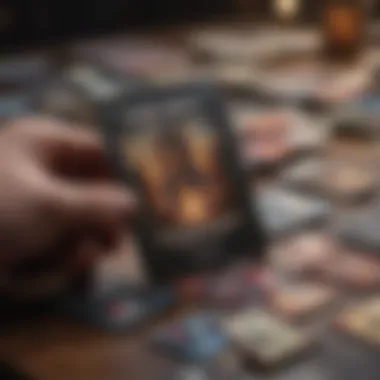Exploring the Value of Card Packs in Gaming


Intro
The gaming industry continyes to evolve at a rapid pace, introducing diverse formats that enhance player experiences. Among these formats, card packs play a crucial role. Players are increasingly drawn to these collections, seeking creativity and strategy. Understanding the various types of card packs and their benefits can profoundly impact the gaming experience.
In this article, we explore the multifaceted world of card packs. From short-term engagement to long-term investments, card packs offer varying levels of utility. Choosing the right one enables gamers to maximize their potential. We will analyze market trends, including popular releases and upcoming launches that integrate innovative card mechanics.
Each section sheds light on key considerations for buying card packs, ensuring a well-informed decision. This guide serves both newcomers and seasoned players, outlining the essentials of making strategic investments in card-based gaming.
News Updates
As the gaming landscape expands, several noteworthy announcements are relevant to card pack enthusiasts. Major games such as
Prologue to Card Packs
Card packs hold significant importance in the gaming world. They are not just collectible items; they serve practical gameplay functions and enhance player experience. Whether used in competitive settings or for casual enjoyment, these packs can lead to strategic advantages or even define the gameplay itself. Numerous players buy them to improve performance or build on personal collection. As such, understanding card packs is essential for anyone looking to engage seriously with card-based games.
Defining Card Packs
Card packs are packaged sets of cards intended for tabletop games, trading card games, or digital platforms. Each pack usually includes a random assortment of cards. Depending on the game, specific functions of these cards can range from character abilities to resources and even special effects. Card packs often come in various forms, such as collectible packs, expansion packs, and mystery packs. When players open a pack, they anticipate discovering valuable cards, adding an element of surprise and excitement to their gaming experience. Furthermore, the value and quality of a card vary based on its rarity and effectiveness in gameplay.
The Evolution of Card Packs in Games
The design and function of card packs have evolved significantly over time. Initially, card packs were simple bundles with a consistent formating. Over time, they have diversified into various types catering to player preferences and metrics on gameplay performance. Digital gaming further transformed card packs, introducing mechanics like online trading, season passes, and integration with gaming ecosystems. This evolution reflects both technological advances in gaming and a shift in players' interests toward personalized experiences. As card packs continue to develop, their impact on gaming will certainly grow.
Types of Card Packs
Understanding the different types of card packs is critical for players who want to make informed purchasing decisions. Each type offers unique features and benefits that cater to varying levels of engagement, investment goals, and gameplay needs. This section explores collectible card packs, expansion packs, starter packs, and mystery card packs in detail, highlighting what each type can offer.
Collectible Card Packs
Collectible card packs are a staple in many games, appealing primarily to die-hard enthusiasts. These packs usually contain cards that players aim to collect not only for gameplay purposes but also as collectible items. Each card often possesses a unique value based on its rarity, artwork, or demand within the community.
Benefits of Collectible Card Packs include:
- Emotional Connection: Collecting can foster a deeper connection to the game as players immerse themselves in its lore.
- Value Appreciation: Some cards, particularly rare ones, can appreciate value over time, making them potential investments.
- Community Engagement: The collecting experience enhances social interactions at gaming events and online forums.
However, one must also consider the financial implications. Without careful purchasing, it is easy to overspend on minimal returns.
Expansion Packs
Expansion packs provide additional content for existing games, allowing players to extend their gaming experience. By purchasing these packs, players access new cards, which often modify strategies and enhance gameplay. This type serves to evolve the base game while keeping the community engaged.
Important aspects of expansion packs include:
- Enhanced Gameplay: New cards can introduce fresh mechanics, adjustments, or improved synergy among existing cards.
- Story Arcs: Often, expansion packs continue the narrative from previous releases, drawing players into more intricate storylines.
- Engagement with Meta Trends: These packs frequently align gameplay with current trends, ensuring the game doesn't feel static.
A thorough evaluation of expansion pack compatibility with personal decks is essential for maximizing gameplay enjoyment.
Starter Packs
Starter Packs are specifically designed for newcomers. They provide essential cards that ensure beginner players have a baseline to start with. These packs often guarantee that new players can start playing without a significant initial investment.


Considerations for Starter Packs include:
- Accessibility: An investment in a starter pack can quickly lower the learning curve for beginners.
- Balanced Gameplay: Starter packs often include a mix of cards that are conducive to a well-rounded initial experience.
- Add-on Opportunities: Once players gain expertise, they can expand their collection through further purchases.
New players should examine the effectiveness of the cards to prevent being overwhelmed.
Mystery Card Packs
Mystery card packs add an element of surprise and excitement for players who enjoy unpredictability in card collection. Typically, these packs do not disclose the content prior to purchase. The suspense and random nature of the cards make each purchase an adventure.
Highlights of Mystery Card Packs are:
- Surprise Factor: The unknown contents can bring an element of fun and elevate the purchasing experience.
- Discovery and Collection: Players may gain access to cards they would not ordinarily consider.
- Exclusive Cards: These packs sometimes include unique or limited edition cards only available through this purchase mechanism.
Yet buying mystery card packs can lead to dissatisfaction if a player does not receive desirable cards. It can turn exciting into frustrating if these purchases become frequent without understanding associated risks.
Assessing the Value of Card Packs
Assessing the value of card packs is critical in the broader discussion of gaming because it informs players about their investments and overall gaming experience. Card packs often serve as significant vehicles for enhancing in-game capabilities, unlocking narratives, and adding depth to gameplay. However, understanding their value requires a multidimensional approach, factoring in financial aspects, gameplay integration, and collectability.
This section aims to drive home the importance of evaluating both immediate and long-term benefits when considering the purchase of card packs. Players should be aware that what might appear a valuable asset initially can become redundant or underwhelming over time. Thus, it is essential to dissect various dimensions that contribute to their value in the gaming ecosystem.
Cost vs.
Benefit Analysis
When contemplating the cost versus benefits of card packs, players need to analyze meticulously the expense involved against the potential rewards they aim to achieve. Card packs are often priced variably, depending on type and rarity. A standard pack might be more accessible financially, while a unique expansion pack might demand a higher price. The essence lies in calculating if what players gain from them justifies their expenditure.
Important factors include:
- Play Content: Does the pack enhance the gameplay significantly?
- Long-term Utility: Will the cards remain relevant as gameplay evolves?
- Resale Value: In scenarios with secondary markets, can cards maintain value?
Ultimately, knowing players' needs informs this analysis. Some may seek enjoyment through enhancement of their deck, while others might focus on competitive advantage or collection completion.
Impact on Gameplay
In many games, card packs can create considerable shifts in gameplay dynamics. The introduction of new cards can drastically alter existing strategies or meta scenarios usually dominant in competitive environments. It is essential to comprehend how specific cards from these packs enhance or challenge one's current strategies.
The impact can be categorized into:
- Enhanced Strategy Development: New cards can inspire innovative strategies.
- Game Balance: Occasionally, new cards can disrupt existing game balance, leading developers to address these in subsequent updates.
- Community Engagement: Card packs can generate discussions within gaming communities, driving collaborative solutions or strategies.
Understanding these aspects enables players to maximize cards they acquire from packs.
Rarity and Its Significance
Rarity possesses a multifaceted role in defining a card pack's value. Cards categorized as rare or even legendary frequently carry intrinsic worth, often driving cost upward in marketplaces. Notably, this sets off a chain reaction concerning the desirability amongst players.
Key components relating to rarity include:
- Collectability: Rarer cards might boost the overall collection value, transcending mere gameplay utility.
- Game Performance: Often, rare cards offer superior capabilities or features not found in common cards.
- Market Demand: The market ascribes nuanced value based on rarity; scarce cards almost always draw attention in trades and exchanges.
Here's a fact to consider regarding rarity: the unique dynamics governed by in-game economies directly affect player approach to card packs. Awareness of rarity leads thoughtful players to make strategic choices concerning effective investment when approaching these products.


By evaluating cost, gameplay implications, and rarity, gamers prepare themselves to invest wisely as they navigate the sometimes complex landscape of card packs.
Strategies for Purchasing Card Packs
When it comes to acquiring card packs in the gaming arena, having a strategic approach can significantly enhance your overall experience. Understanding where to buy, when to invest, and how to maximize deals will help buyers get the most value out of each transaction. Unlike impulsive purchases, strategic buying requires research, planning, and a bit of patience. This section outlines key methodologies that every discerning gamer should consider before making a financial commitment.
Identifying Trusted Sources
Finding a reliable seller for card packs is paramount. A trusted source ensures that you are purchasing genuine products that have valid contents. Here are a few considerations:
- Reputable Retailers: Opt for well-known names such as Amazon, Walmart, and local game shops. They typically have return policies in case problems arise.
- Digital Platforms: For digital card packs, platforms such as Steam or the PlayStation Store offer a sense of security. These platforms regularly update their libraries and are less susceptible to fraud.
- Community Recommendations: Joining forums or subreddits dedicated to gaming can lead to discovering sources that others recommend. For example, checking discussions on reddit.com can uncover hidden gems.
Timing Your Purchases
The timing of your purchase can impact both value and selection. Consider these factors to optimize your buying experience:
- Release Dates: Often, newly released packs have a surge in market interest, and prices may reflect that enthusiasm. Buying right after release could net you competitive pricing if you shop wisely.
- Seasonal Sales: Many e-commerce sites hold sales during holidays or events. Watching for special promotions around times like Black Friday can help you save money while obtaining desired packs.
- Game Updates or Expansions: When games release updates or expansions, they generally provide promotional packs or discounted offers that could be beneficial.
Leveraging Promotions and Discounts
Promotions and discounts provide excellent opportunities to stretch your gaming budgets further. Here are promising approaches to consider:
- Subscription Services: Many games have subscriptions that offer exclusive card packs at a discounted rate as part of a membership. Assess whether a subscription fits your life at the moment, since they may provide pack quantities which could surpass standard purchases in value.
- Special Events: Look for events collated by game developers, which can offer limited-time access to group discounted card packs or exclusive items.
- Join Loyalty Programs: Some retailers may have loyalty programs where you earn points or discounts over time. If you are a frequent buyer of card packs, you may want to investigate these offerings for cumulative benefits.
Always evaluate if the long-term investment sparks joy because it’s about enhancing your gaming experience, not just accumulation.
By employing these strategies systematically, you can substantially improve the process of purchasing card packs. This ensures a well-balanced approach to gaming hobby expenses while leading to more enjoyment in the long run.
Maximizing the Utility of Card Packs
Understanding the concept of maximizing the utility of card packs is vital for players looking to make the most out of their gaming experience. By analyzing how to effectively utilize card packs, players can not only enhance their gameplay but also ensure a more rewarding overall experience. The right strategies can make a significant impact on the value derived from card purchases.
Building Effective Decks
The foundation of a successful card-playing experience revolves around building effective decks. When selecting cards from packs, it is crucial to choose those that create a balanced and functional deck.
Here are some considerations for this:
- Card Balance: The selection should include a mix of card types such as creatures, spells, and equipment. This diversity allows for flexible gameplay.
- Synergy among Cards: Identifying how different cards can work together efficiently can provide substantial advantages. Choose cards that enhance each other’s strengths or cover their weaknesses.
- Player Strategy Adoption: Each player has a style and understanding of the game. Choose cards that complement personal strategy rather than following trends. Knowing what cards suit one’s gameplay style increases the odds of successful outcomes.
Building an effective deck requires both planning and adaptability. Players should continuously evaluate their decks as they buy new card packs and integrate emerging game mechanics into their strategies.
Combining Cards for Synergy
Synergy plays a crucial role in maximizing the impact of individual cards when spending on packs. Identifying the way cards work together is essential in forming powerful combinations. The synergy can involve different categories:
- Types and Attributes: Some cards have effects that activate under specific conditions or in relation to others. It is beneficial to combine cards whose abilities trigger synergistically.
- Cost Management: Cards can influence strategies concerning economy or relevant costs within a game. Finding the right balance between cost-effective cards can lead to robust outcomes in gameplay.
- Game States Relationship: Understanding various game states required by specific cards can significantly enhance their utility. Players should create combinations that enhance their position in any given stage of the game.
Effective combinations lead to powerful outcomes in gameplay. Continuous experimentation with combinations as new cards become available will likely yield exciting discoveries. Keep an eye on variations across packs and consider their potential when incorporated into existing strategies.
Building and combining cards with intention can greatly enhance gameplay effectiveness.


In summary, maximizing the utility of card packs is about learning strategies for both devise great decks and forge effective combinations. Understanding how to assemble cards around a cohesive strategy will help players optimize their experiences and, ultimately, succeed in their endeavors.
Market Trends in Card Packs
Understanding market trends in card packs is crucial for any serious gamer. As digital interfaces become ubiquitous, the transition from physical to digital card packs is reshaping the landscape of gaming. Staying relevant in this rapidly changing environment requires players to navigate these trends thoughtfully.
Shift Toward Digital Cards
The movement towards digital cards has changed how players acquire and use card packs. Many gamers appreciate the convenience that comes with online platforms. In contrast to physical cards, which need storage and can deteriorate over time, digital cards are typically easier to manage and organize.
Moreover, companies now release exclusive digital packs that may contain limited edition cards. Such strategies not only revitalize interest but also instill a sense of urgency in collecting. Players are often enticed by themed events that bring together community interests (like seasonal events or game anniversaries) while providing unique, otherwise unattainable items.
Some key benefits include:
- Accessibility: Available 24/7 across various devices.
- Environmentally friendly: No physical inventory needed, saving resources.
- Community Engagement: Strengthens community bonds through online marketplaces and trading.
However, the digital shift should come with caution. This transition requires players to consider the security of their investments in a purely digital landscape. Digital card theft can happen, emphasizing the importance of reliable portals for trade and acquisition.
Package offers integrating dragons in awesome gameplay dynamics encourage engaging returns on player investments.
Integration with Esports
The connection between card packs and esports has garnered significant traction over recent years. Tournaments often have cash prizes supported by player skill and strategic use of card packs. Esports professionals are increasingly seen leveraging these cards to hone their competitive edge, as skillful combinations enhance individual performance.
Although not limited to just tournament structures, esports have olives the landscape, demonstrating values in community engagement and excitement. Competitive gaming titles, such as Hearthstone, offer a glimpse into the growing importance of card combinations enabling sophisticated tactics. Players often form meaningful team partnerships, where card synergy is analyzed carefully to foster collective strategic prowess.
From a market perspective, multiple publishers foster foresight and access with their card packs—mixing exhilarating gameplay dynamics with an approachable economic model that many newcomers find intriguing.
Ultimately, card packs play an instrumental role in sustaining and elevating the esports ecosystem. Gamers keen on developing their skills must remain astute to how trends in both digital offerings and esports help shape the future of gaming. Responding proactively to these changes will lead those who embrace them to greater satisfaction and mastery within this ever-evolving domain.
Potential Future Developments
The landscape of card packs in gaming is subject to constant evolution. With advancements in technology and shifts in player preferences, future developments promise substantive changes. Engaging with innovative design strategies and the rise of digital assets is vital. Both these aspects could dictate the user experience, gameplay dynamics, and, ultimately, market viability.
Innovations in Card Design
As gamers become more sophisticated, the need for innovative card designs increases. Traditionally, cards featured predefined angles and aesthetics. However, modern designs may incorporate variable elements that adjust to player decisions or outcomes. This opens avenues for individualized gameplay experiences. New materials can allow cards to have unique textures or sensory feedback. For example, implementing technology like NFC could turn a physical card into a digital asset with specific functionalities. This level of interactivity may greatly influence how packs are utilized and perceived.
The trends towards graphic enhancements and better print technologies mean a stunning display of artistry. Artists can push boundaries unlike before, and this might draw in collectors beyond just functionality. Customization could also connect players deeper with their cards. Styles shaped by user preferences may shift the market toward higher demand for unique compositions.
Emergence of NFTs and Card Packs
The digital arenas have seen the emergence of non-fungible tokens (NFTs), a development with significant implications for card packs. Incorporating NFTs into card packs allows for a new layer of ownership, value, and transferability. A unique card on a digital platform not only represents a collectible but can appreciate in value based on demand.
By attaching NFT attributes, pack owners can easily trade or showcase their assets online. This revolutionary approach transforms typical card collecting. The merger between real and digital worlds gains traction, combining traditional card gameplay with blockchain technology. However, potential challenges remain. Issues surrounding legality and environmental concerns (due to electricity consumption) significantly impact the broader acceptance of NFTs.
"The innovation in card game design does not only change the aesthetic appeal; it also offers players new dimensions of interaction."
By embracing such developments, the gaming industry aims not only to keep pace with technological advances but also to enrich the gameplay experiences of evolving audiences.
Epilogue
The exploration of card packs in gaming reveals a complex landscape, characterized by diverse types and underlying values. It's essential to understand the unique features of each pack type—collectible, expansion, starter, and mystery packs—to make informed purchasing decisions. Each category offers distinct bonuses and opportunities for gamers.
Final Thoughts on Card Packs
Card packs have evolved from simple additions to games into substantial aspects of gameplay. They enhance player experiences, provide access to new content, and enhance strategy through deck-building principles. Moreover, as the market shifts, games like Magic: The Gathering, Hearthstone, and Yu-Gi-Oh! have proven how valuable these packs can be within the gaming narrative, harmonizing engagement with tangible benefits. The versatility of these packs, aside from just their monetary value, cannot be underestimated. They hold the potential to enhance not just individual play, but also add layers of interaction within gaming communities, particularly in areas like esports.
Encouraging Informed Purchasing Decisions
Players should approach card pack purchases judiciously. This involves evaluating personal goals, gameplay requirements, and financial considerations. Researching reputable sellers is crucial—whether it be through platforms like eBay, gaming forums, or trusted game stores, ensuring purchases bring genuine enjoyment. Timing purchases during events, sales, or promotions can also prove beneficial, potentially allowing players access to more valuable packs at competitive prices.
While the excitement surrounding card packs can drive impulse purchases, players should focus on creating a structured buying strategy. This clarity ensures that investments in card packs substantively impact their gameplay experience, rather than simply filling collections without strategic thought.







